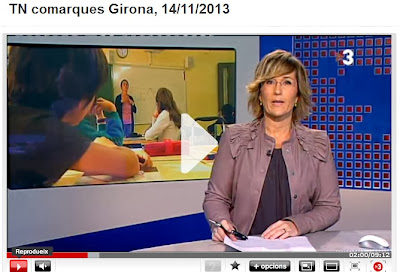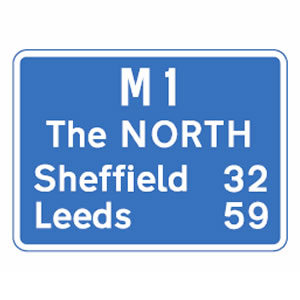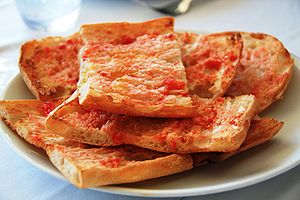Saturday 21 December 2013
Tuesday 17 December 2013
Our "pessebre"
This Christmas the boys and the girls from the 5th and 6th grade made a "pessebre".
We made it with plasticine. We made some groups and each group had to represent an scene of the "pessebre" in a shoe box. For example: the manger was a shoe box, the devils were in another shoe box, the shephards in another one...
It was so funny making the "pessebre"!
Mar
Monday 16 December 2013
International Project
Last year our 6th graders started exchanging emails in English with some students in US schools. We met them in ePals Global Community.
This year we decided to go one step further and start sharing some projects. Our first project is a wiki about Christmas Traditions. We wrote about our Catalan and Spanish traditions and ourepals from Bellevue, Kentucky, USA wrote about theirs.
Thank you for being our parterns. It's been a great experience!
This year we decided to go one step further and start sharing some projects. Our first project is a wiki about Christmas Traditions. We wrote about our Catalan and Spanish traditions and ourepals from Bellevue, Kentucky, USA wrote about theirs.
Thank you for being our parterns. It's been a great experience!
Xmasnadal wiki
In our class, 6th grade, we created a wiki which explains some of our Christmas traditions. We want all the people around the world learn about them.
-In Catalan Xmas songs, we uploaded some of our traditional Catalan Christmas songs like: “A Betlem me’n vull anar”, “M’agrada el Nadal” & “Ara ja és Nadal”.
-In Catalan traditions we explained “El Tió”, “El pessebre”, “El pessebre vivent”, “El caganer” & “El poema de Nadal”
-In Spanish traditions we wrote about: "Christmas holidays", "Torrons”, "New year's Eve" “Els tres reis", "Tortell de reis", &“El dia dels innocents”.
-In Other traditions we put: “Invisible friend” & “Advent calendar”.
Júlia
Monday 25 November 2013
Sol Solidari
Three weeks ago a man called Deli from Sol Solidari came to our class to explain us how they help people in Africa to cook their food using solar technologies.
He showed us a solar stove and we could heat water under the sun in our playground. We found out that it's possible to cook without electricity.
When we went to the class he showed us a power point and we could see photos of the projects Sol Solidari has in Africa. We think that solar stoves are very useful even in developed countries because we can save electricity and money.
We liked his talk very much. Thank you for coming to our school.
Thursday 14 November 2013
We were on TV!
On Thursday 14th of November, TV3 came to our school. They wanted to record us because we study Science and Art in English.
They recorded us while we were giving a presentation to the other students in our school. We explained them how to save energy. It was part of our Energy Saving Campaign.
Doing a presentation with the television recording us wasn't easy beacuse we were very nervous, but the cameraman was very friendly with us!
The video appeared on TV3 the same day at midday. It was an amazing experience!
Energy saving campaign (II)
 This term, the 6th graders are studying Energy. We are doing different activities in class: worksheets, on line games, videos, models of solar toys, ...
This term, the 6th graders are studying Energy. We are doing different activities in class: worksheets, on line games, videos, models of solar toys, ...Now we are making posters with different tips that we think are important to save energy at school and at home.
 We are preparing some presentations to explain to the other classes what they should do to save electricity. We are going to explain it in Catalan to the little ones, in English and in Catalan to the 1st and 2nd graders, and to the other ones in English.
We are preparing some presentations to explain to the other classes what they should do to save electricity. We are going to explain it in Catalan to the little ones, in English and in Catalan to the 1st and 2nd graders, and to the other ones in English.We think that saving energy is important because we save money. It's also important to be aware of the energy we spend because we need it, and the energy we waste.
6th graders
Tuesday 5 November 2013
"La Castanyada"
Two weeks ago, on the 25th of October, we celebrated "La Castanyada" which is a popular festival in Catalonia.
Our class, the 6th graders, dressed up as chesnut sellers, and we handed out chesnuts in newspaper cones. The chesnuts were delicious!
The youngest students sang a song called "El bolet" (the mushroom, in Catalan). Each grade made a circle in the playground and then everybody ate chesnuts. Even our families!
We had a great time and we want to repeat this festival next year!
6th graders
More photos...
Monday 21 October 2013
Energy saving campaign (I)
On Thursday 17th a mechanical engineer called Fèlix Mora came to our school. He explained us how to save energy at school and at home. He gave us some tips:
* It's better to have a shower than a bath because we are saving water and electricity at the same time.
* We have to put the dishwasher and the washing machine when they are full.
* We have to clean the light bulbs because they make more light with the same energy.
* We should use natural light, heat and cooling.
* We have to switch off the projectors when we don't need them.
* We should switch off the lights if we are not going to be in the classroom for more than half an hour.
* When we have to buy new light bulbs we should look at the scale energy label and the light they produce (lumen)
Sunday 15 September 2013
Units of measurement
If we travel to the United Kingdom or the USA we should be careful with the road signs. They use a different system of measurement called The Imperial System.
1 mile /maɪl/ = 1.609344
kilometres /kɪˈlɒmɪtə/
When they talk about how tall they are, they also use different units as the ones we use.
1 foot /fʊt/ ( pl feet
/fiːt/) = 0.3048 metres /ˈmiːtə/
1 inch /ɪntʃ/ = 2.54
centimetres /ˈsɛntɪˌmiːtə/
Thursday 12 September 2013
The Catalan National Day in the international mass media
You can practice your English reading about the Catalan National Day and watching the BBC's videos.
BBC : Catalans' human chain stretches across north-east Spain
The Guardian: Catalans join hands in huge human chain for independence from Spain
The Telegraph: 400,000 person human chain stretching 250 miles for Catalan independence
The New York Times: Linking Hands, Catalans Press Case for secession
Tuesday 18 June 2013
Solar cookers
Last term the 6th graders were working on Energy: energy sources, types of energy and saving energy tips.
After watching next video we had an idea...
How about building our solar cookers? And that's what we did. Our students got really engaged in the project and they made their cookers with their families.
In a really sunny day we went to the playground to find out if their cookers worked or not.
And yes, they did! Congratulations for your effort! It was worth it!
And we were in the local newspapers!
After watching next video we had an idea...
How about building our solar cookers? And that's what we did. Our students got really engaged in the project and they made their cookers with their families.
In a really sunny day we went to the playground to find out if their cookers worked or not.
And yes, they did! Congratulations for your effort! It was worth it!
And we were in the local newspapers!
Thursday 2 May 2013
Astronomy
 On the 10th April we went to the University of Girona to listen to a talk about astronomy, the Sun, Galileo Galilei and his discoveries about the Solar System.
On the 10th April we went to the University of Girona to listen to a talk about astronomy, the Sun, Galileo Galilei and his discoveries about the Solar System.We listened to an astronomer, we saw some videos about the eruptions of the Sun and we made a short movie to discover how many days the sun needs to rotates. We also saw some sunspots using a Solarscope.
Then we went to a little inflatable Planetarium to see the planets of the Solar System, their moons and some constelations and galaxies.
FF
Wednesday 17 April 2013
Roanoke Island: Our stop motion
That's the end of our Social Science Unit about the Colonization of North America. We worked very hard to prepare the stop motion and we learnt a lot.
We hope you enjoy it!
.
We hope you enjoy it!
.
Sunday 14 April 2013
The Giant's Causeway and the Legend of Finn McCool
NG kids
In the classroom we are studing the Giant’s Causeway, we know that there were two giants:
Finn Mccool from Ireland and Fingal from Scotland.
The legend says that Fingal made the Giant’s Causeway throwing rocks to return to Scotland.
But the scientists say that there was a volcano and it erupts.
FF and DF (6th)
In the classroom we are studing the Giant’s Causeway, we know that there were two giants:
Finn Mccool from Ireland and Fingal from Scotland.
The legend says that Fingal made the Giant’s Causeway throwing rocks to return to Scotland.
But the scientists say that there was a volcano and it erupts.
FF and DF (6th)
Wednesday 3 April 2013
Epals
This term the sixth graders are starting an ePals project within a safe, protected on line environment: ePals Global Community.
ePals Global Community is a world's network of K-12 classrooms, enabling students and teachers to safely connect and collaborate with classrooms in more than 200 countries and territories.
Each student is going to have two epals. I want them to use English as a communicative language and learn about different English-speaking countries and their cultures.
These are the profiles of the two schools I chose:
one in Australia
and the other in the USA.
Today students started answering the first mails they got from their epals in Kentucky and introducing themselves to the Australian ones. They were really excited!
Good luck with your epals and enjoy this new experience!
ePals Global Community is a world's network of K-12 classrooms, enabling students and teachers to safely connect and collaborate with classrooms in more than 200 countries and territories.
Each student is going to have two epals. I want them to use English as a communicative language and learn about different English-speaking countries and their cultures.
These are the profiles of the two schools I chose:
one in Australia
and the other in the USA.
Today students started answering the first mails they got from their epals in Kentucky and introducing themselves to the Australian ones. They were really excited!
Good luck with your epals and enjoy this new experience!
Friday 29 March 2013
Cathedral's project: Our presentations
The 6th graders prepared in small groups some presentations about Girona's cathedral. It was not easy to write about Art in English but they worked very hard.
Cathedral amc from verdenglish
Cathedral 3 from verdenglish
Thursday 28 March 2013
Cathedral's project: Girona
Girona is a beautiful
city on the North East of Catalunya, Spain. It’s near the mountains, the beach
and Barcelona too.
The weather in Girona
is good, hot in summer and cold in winter.
The main language is
Catalan but people can speak Spanish too.
In Girona there
aren’t many houses, there are lots of flats. There are some famous modernist
houses made by Masó, an architect from the city.
There are four rivers
in Girona: Ter, Onyar, Güell and Galligants. There are lots of beautiful
bridges to cross them: Pont de Pedra, Pont de Ferro (made by Eiffel) ...
Girona has got a big
natural park named La Devesa ,
full of enormous Platanus x acerifolia. A lot of people go there to do sport.
Girona has got a football team, Girona FC, and a stadium. There are famous football players.
In Girona there are
many museums: the Art Museum, the Cinema Museum... There are also restaurants
and lots of shops.
3rd graders CAN SING!
Friday 8 March 2013
EARTH MOVEMENTS
We are studying the Earth movements.
To do this we had an Earth balloon and torches in small groups. We had to discover things and answer some questions:
- Which is the movement that produces day and night?
-If now in Girona it's 10 o'clock in the morning, what's the time in other countries?
-What would happen if the Earth didn't move?
It is quite difficult but fun to discover things and not just read the information.
We also had some help watching videos.
Another day we had a Tellerium, which is a reproduction of the Sun and the Earth movements. It was helpful to understand the seasons.
To do this we had an Earth balloon and torches in small groups. We had to discover things and answer some questions:
- Which is the movement that produces day and night?
-If now in Girona it's 10 o'clock in the morning, what's the time in other countries?
-What would happen if the Earth didn't move?
It is quite difficult but fun to discover things and not just read the information.
Wednesday 6 March 2013
Roanoke Island (backgrounds)
These are the backgrounds for the film: the queen's palace, the harbour and the island.
They are awesome!
They are awesome!
Saturday 2 March 2013
Roanoke Island (sound)
Our Stop Motion is in progress.
We already recorded the sound and the backgrounds are almost finished.
Now we're ready to move the toys and take the pictures. Roanoke Island Stop Motion by Verdenglish
We already recorded the sound and the backgrounds are almost finished.
Now we're ready to move the toys and take the pictures. Roanoke Island Stop Motion by Verdenglish
Friday 22 February 2013
History
This term we're studying the British colonization of the Americas. There are lots of important people in the unit and it's interesting to learn about them: Sir Humphrey Gilbert, John White, Sir Walter Raleigh, Elizabeth I, Virginia Dare...
The teacher gives us worksheets and we watch films. We have a wiki to study what we do in the classes.
We are preparing a stop motion about The Lost Colony. with playmobils. We are working very hard.
We are working in groups. Everyone decided what we wanted to do:
1.- writers
2.- The speaking group
3.- Artists: backgrounds, , the photographers and the movie makers (move the toys).
4.- Computing
The writers finished their part.
Now we are bringing the toys to the classroom.
Next week we'll start recording the voices. When we finish the film we will publish it in the blog.
This unit is difficult to understand but it's more interesting than the one about nutrition. It's also important to learn about history.
History can be boring but if we use wikis, films and cool activities it can be fun.
6th graders
Wednesday 30 January 2013
SOLAR SYSTEM ACTIVITIES
This term we are learning about the Solar System.
In groups we searched internet to find information about the planets and we wrote it in our Solar System Wiki. It was a little bit difficult but it was fun.
We have also drawn the planets at scale in the playground.
We like learning about the Solar System but we find it quite difficult.
5th graders
In groups we searched internet to find information about the planets and we wrote it in our Solar System Wiki. It was a little bit difficult but it was fun.
We have also drawn the planets at scale in the playground.
We like learning about the Solar System but we find it quite difficult.
Thursday 3 January 2013
Subscribe to:
Posts (Atom)

























